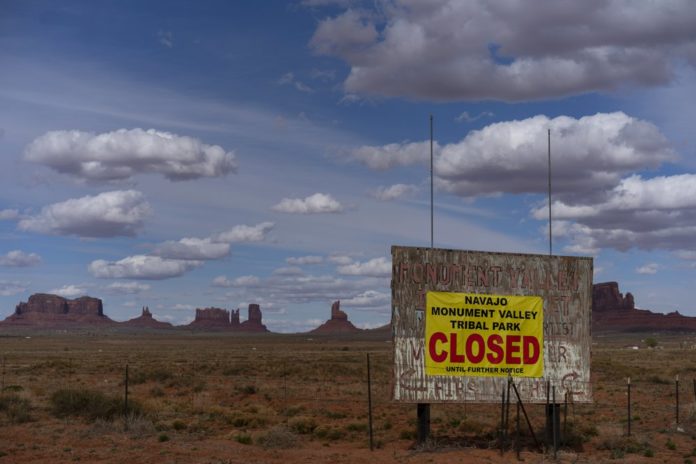
As Monica Harvey watched, crowds flocked to a Sam’s Club in northern Arizona where she works, picking shelves clean of toilet paper and canned goods. Native American seniors couldn’t move fast enough, and Harvey saw their faces fall when they reached empty shelves.
The Navajo woman wanted to help tribal elders get household staples without leaving their homes and risking exposure to COVID-19, so she started Defend Our Community, a group that delivers supplies.
Tribes across the nation are working to protect elder members who serve as honored links to customs passed from one generation to the next. The efforts to deliver protective gear, meals, and vaccines are about more than saving lives. Tribal elders often possess unique knowledge of language and history that is all the more valuable because tribes commonly pass down their traditions orally. That means losing elders to the virus could wipe out irreplaceable pieces of culture.
“When you lose an elder, you lose a part of yourself,” said Harvey, who lives in Leupp, Arizona, east of Flagstaff. “You lose a connection to history, our stories, our culture, our traditions.”
Harvey remembers her own grandfather explaining the stories behind Navajo songs and teaching her Navajo words from the songs. She often listened to her grandparents speaking Navajo while she practiced the words under her breath.
In Oklahoma, the Cherokee Nation has increased food distributions to elders and offered financial aid to those who were struggling to pay rent or utilities. Concern for elders is also apparent in the tribe’s COVID-19 vaccine-distribution plans. Participants and workers in the tribe’s elder program are first in line for the shots, along with hospital workers and first responders. Next are those whose first language is Cherokee and others considered “tribal treasures,” an honor given to members who keep Cherokee art, language, and other culture alive through their work.
An effort among the Blackfeet in Montana is helping the tribe’s 600-plus members connect with elders who need support. Connecticut’s Mashantucket Pequot Nation is providing its citizens with masks and telemedicine, delivering meals to their doors, and organizing home visits to give flu vaccines.
“Elders are like libraries. Losing one is like a library burning down,” said Loren Racine, creator of a Facebook page offering help in the Blackfeet community.
Roy Boney Jr., who manages a Cherokee language program, said the vast majority of Cherokee speakers are elders. They make up a small pool of people the program relies on to teach the language he calls the “beating heart” of Cherokee identity.
“For decades our language has been taken from us through forced assimilation,” Boney said. “Elders hold our history and culture but also our language… Our elders are precious.”
Almost half of the Cherokee who received care from the tribe’s health services but died from the coronavirus were fluent Cherokee speakers. Losing even a handful of speakers can be devastating for language preservation and other cultural practices, Boney said.
“With them goes so much information in terms of language knowledge, dialect, specialized knowledge of medicine and traditional practices,” he said. “All these things we’re trying to revitalize and save, they’re the heart of all of it.”
Mashantucket Pequot elders shifted to a virtual format for the intergenerational gatherings where they tell traditional stories. An elders council also helps to organize Pequot language bingo nights and Schemitzun, the annual Festival of the Green Corn.
“When we heard how COVID-19 was spreading, we were immediately concerned for our elders and how losing them would affect the tribe, so we immediately started working to protect them,” said the tribe’s chief medical officer, Setu Vora.
The tribe has no known COVID-19 deaths.
Pequot elders play an important role in the effort to revive the tribe’s language, which is no longer widely spoken. Elders still remember relatives who spoke the language and can verify the definitions and context of certain words. A handful of the tribe’s 2,000 members are becoming somewhat proficient in Pequot as they research and reclaim new words, Vora said.
Karen Ketcher was among 28 Cherokee Nation elders who have died from the coronavirus. She was weeks shy of her 71st birthday and had decades of experience working for the tribe and the U.S. Bureau of Indian Affairs. Her knowledge was unmatched and invaluable, said her granddaughter, Taryn King.
“There’s so much at stake when this virus hits our communities,” said King, 31, of Stilwell, Oklahoma. She described elders as “the glue that holds our communities together.”
At work, Ketcher was affectionately called “Granny.” She was the go-to person for questions about Cherokee policies, tribal governance, and how to apply for grants. She also was the first stop for snacks, help mending holes in sweaters, or questions about community relations.
One co-worker, Kamisha Hair, went into Ketcher’s office shortly before the tribe temporarily closed it in March because of the pandemic. She assured Ketcher things would be OK and implored her to pray.
The two hugged and said they loved each other. Ketcher died in April.
Relatives held a small outdoor service for her. When they returned to town, other Cherokees had lined the streets to pay their respects.
“Losing an elder like Granny is like losing a piece of your identity,” Hair said. “It dies with them, and you can never get it back.”
Republished with the permission of the Associated Press.














